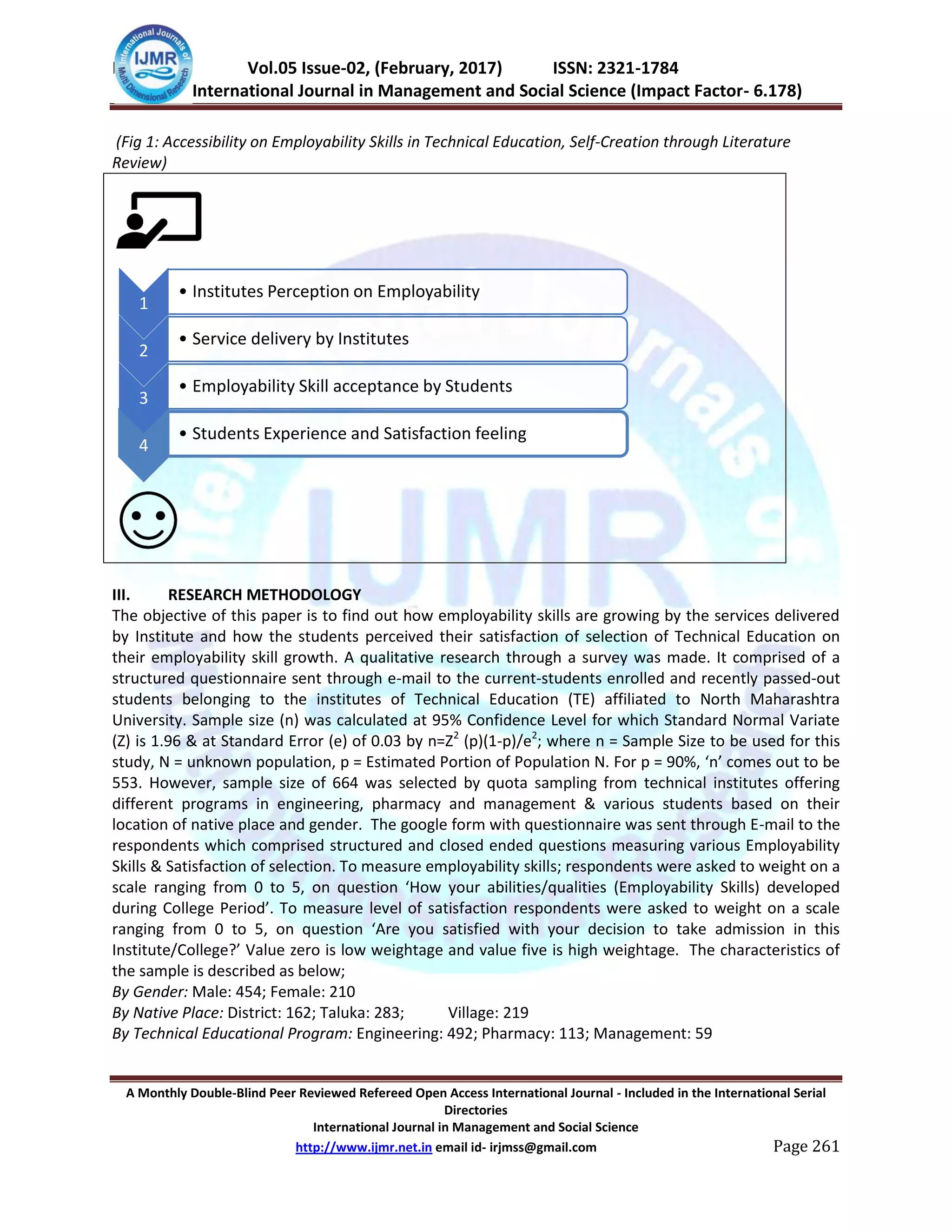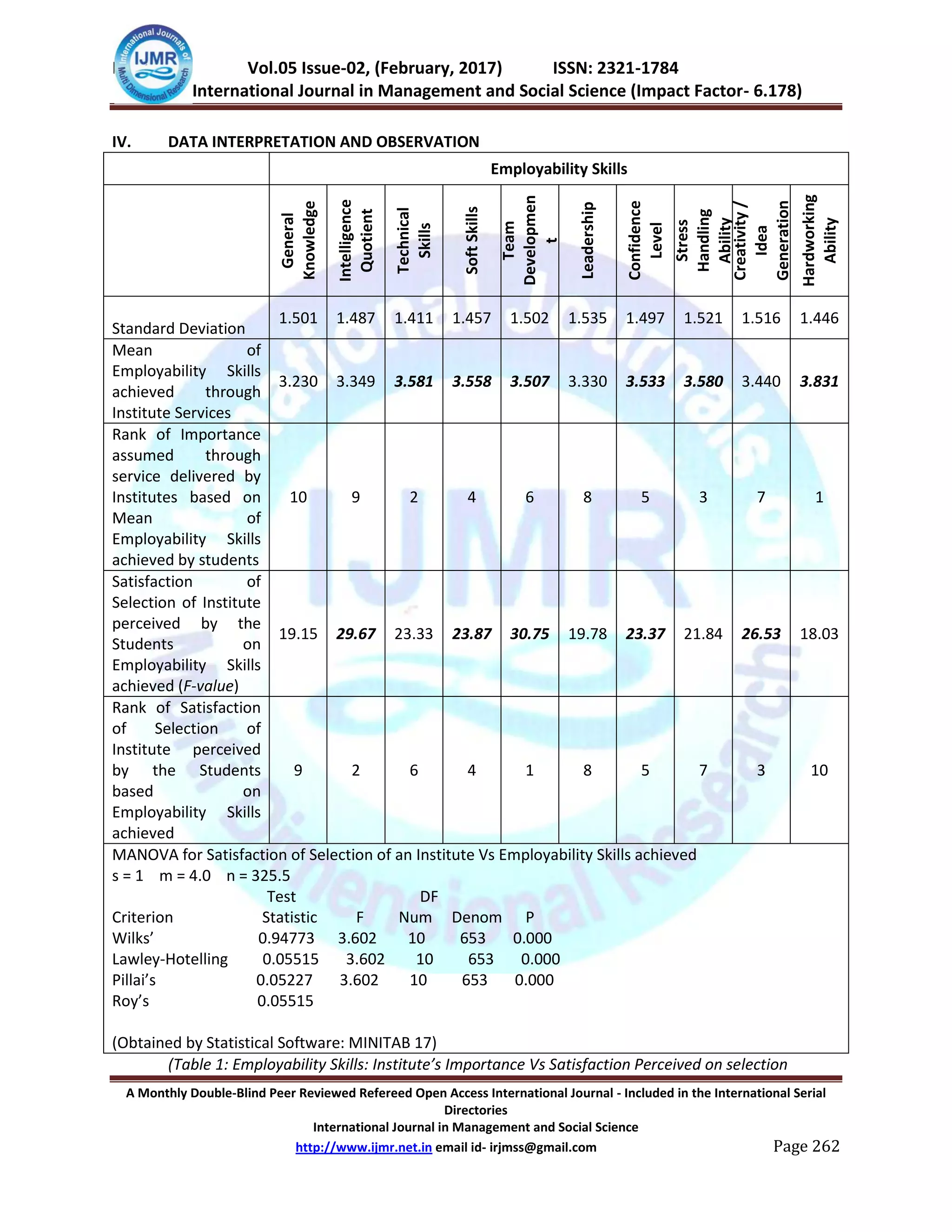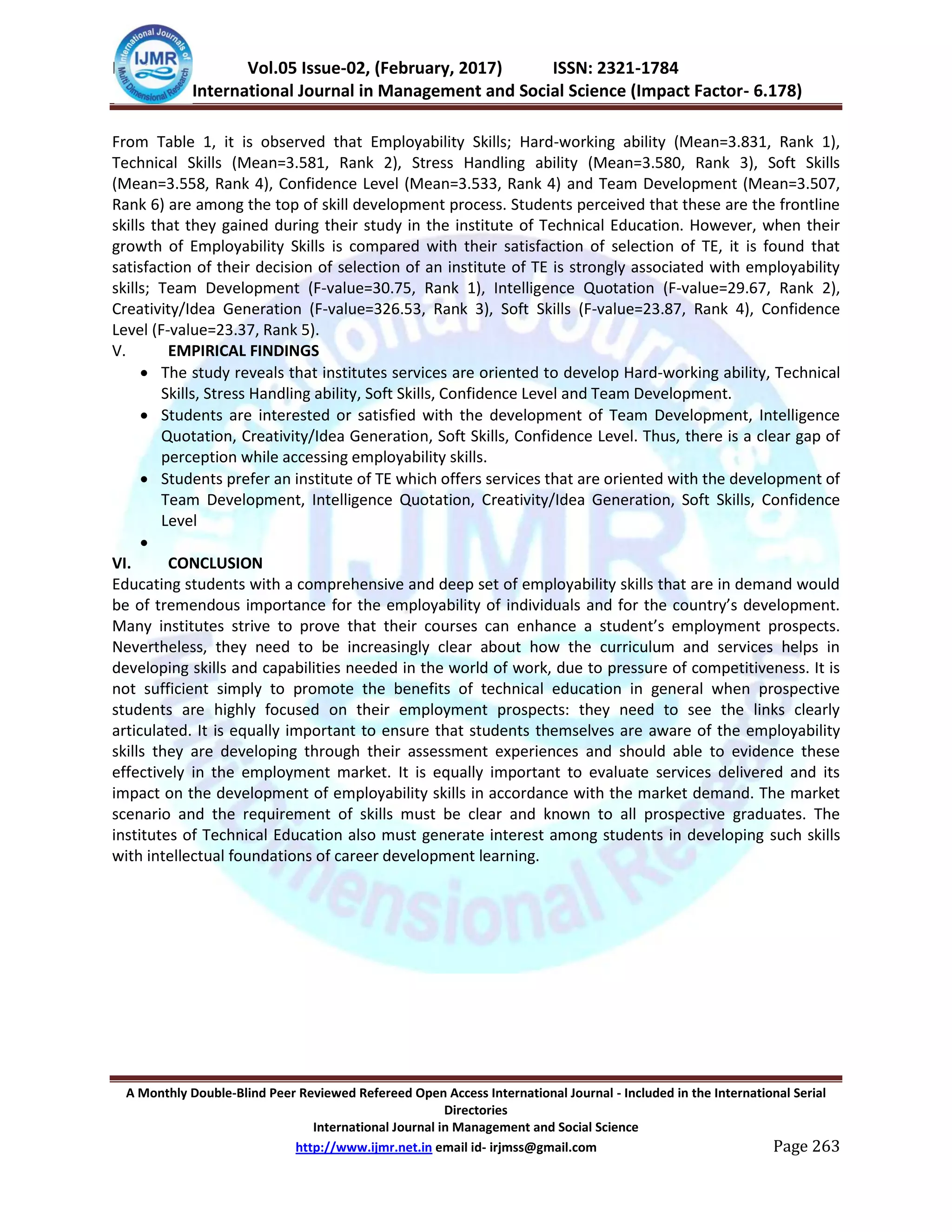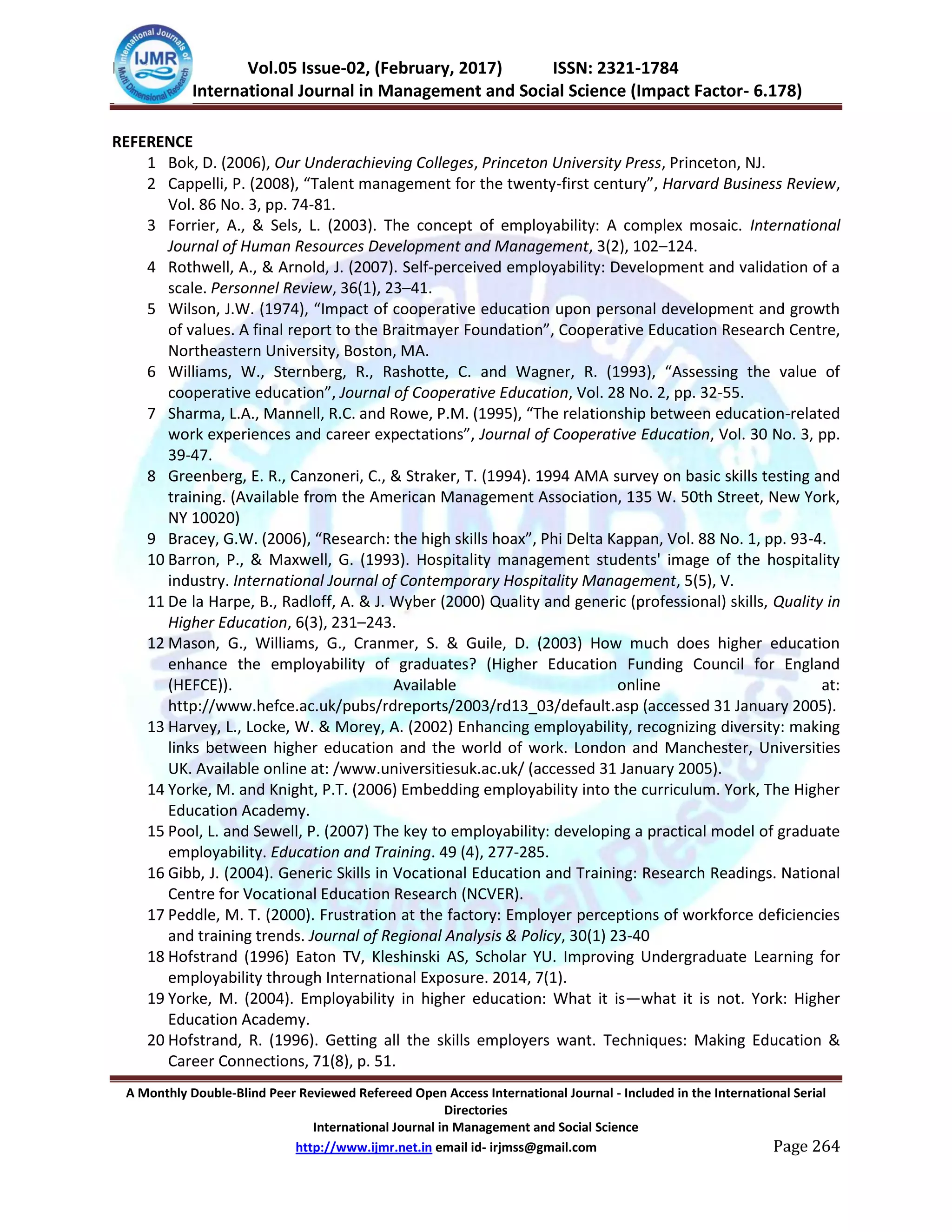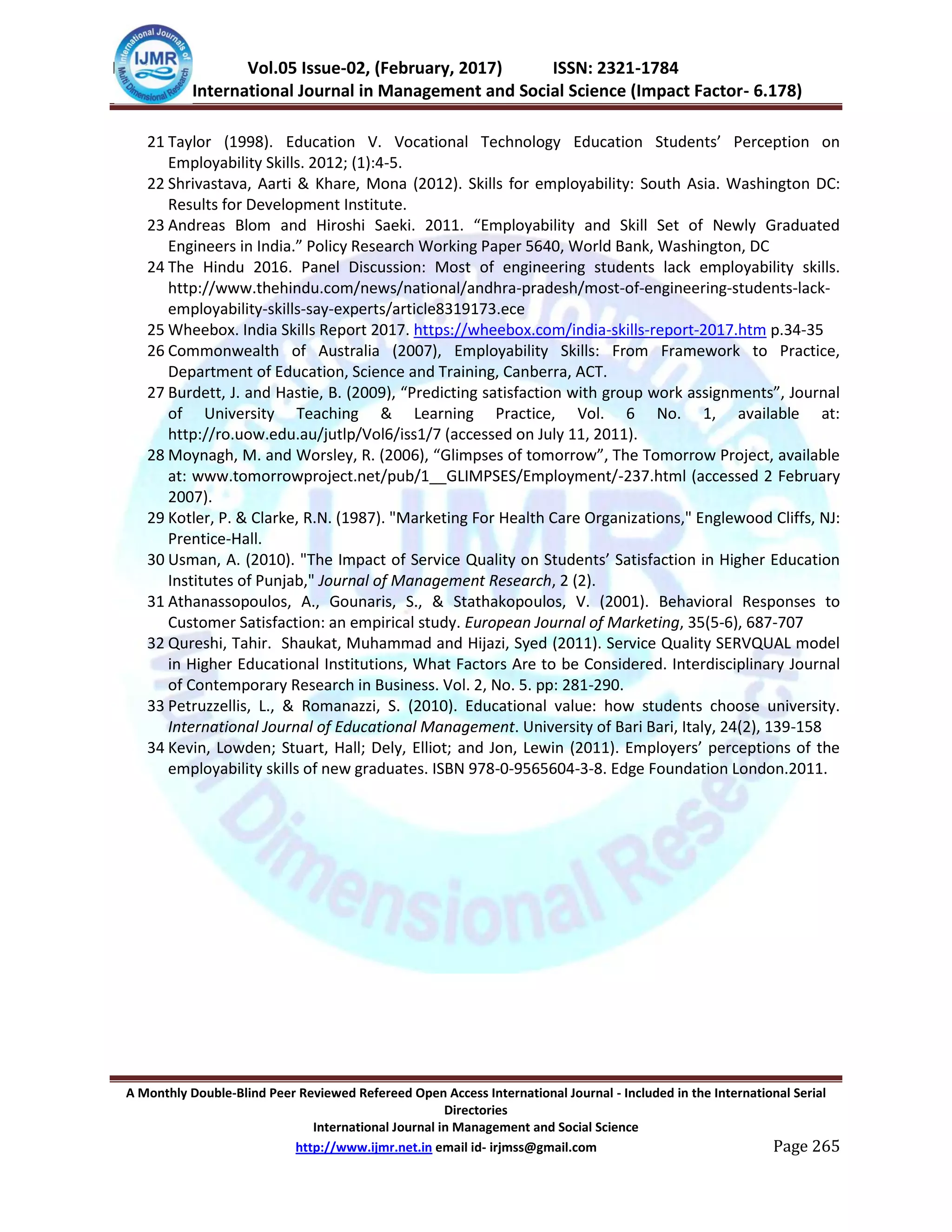This study examines the relationship between the employability skills promoted by technical education institutes and the satisfaction of students regarding their selection of these institutes. It highlights the importance of aligning the services provided by educational institutions with the expectations of students to enhance their employability and overall satisfaction. The findings indicate that key employability skills such as teamwork, technical skills, and stress handling are significantly associated with students' satisfaction levels.
![IJMSS Vol.05 Issue-02, (February, 2017) ISSN: 2321-1784
International Journal in Management and Social Science (Impact Factor- 6.178)
A Monthly Double-Blind Peer Reviewed Refereed Open Access International Journal - Included in the International Serial
Directories
International Journal in Management and Social Science
http://www.ijmr.net.in email id- irjmss@gmail.com Page 258
Approach to Employability Skills in Technical Education & its impact on satisfaction of selecting an
Institute.
Mahajan P. T. Golahit S. B.
Research Scholar
Registrar, R. C. Patel Institute of Technology, Shirpur,
Maharashtra, India
Research Guide
Head of Department, Department of
Economics,
KVPS’s, S.P.D.M. College,
Shirpur, Maharashtra, India
ABSRACT
Ample of the current motivation to teach and assess employability skills will decide India’s ability to
compete in the world economy. For a win-win situation, there must not be any differences in Institute’s
perception and students’ experience in accessing employability skills for future prospective. What this
paper aims to demonstrate is that, although as academics/service providers, we can use a general term
“Employability skills”, we need to describe what is meant by this term to students, and colleges also
need to recognize how their services and skill development are impacting on satisfaction of students
while accessing employability skills. The purpose of this study is to examine the importance perceived by
the institutes and experience realized by the students and to connect employability skills’ growth on
students’ satisfaction of selection of an institute of Technical Education.
Keywords
Employability Skills, Services, Technical Education, Satisfaction
I. INTRODUCTION
Developing employability skills is an on-going process. Students enter college with the expectation that
they will acquire the knowledge, skills and abilities to enter in the market. Graduates expect that they
have acquired the skills necessary to perform their jobs and to advance their careers. In the modern
knowledge economy, employers have an expectation that a college education will provide graduates
with the employability skills required to perform their jobs *1+. *2+. It is the college’s responsibility to
identify and implement the appropriate soft skills training approach to help students with this transition.
An understanding of the attitudes in relation to these various skills is important because education and
industry seem to work in separate systems, and employers historically have not clearly communicated
their needs and expectations for the college graduates that they have sought to hire. Reference [1]
reported that college professors and administrators felt they were teaching students what they need to
know, although only 35 present of a sample of industry executives thought that colleges taught students
what was important to succeed at work. Previous studies have suggested that employability is a multi-
faceted construct as per reference [3] with both internal and external dimensions [4]. Employability
skills are the results accumulated from various studies to date point to the many benefits of cooperative
education such as students’ improved self-confidence, self-concept and improved social skills [5], gains
in practical knowledge and skills [6], enhanced employment opportunities [7]. There is, however, little
evidence about these students’ expectations from their cooperative education placements about
specific aspects of the job and the organization. In recent years, that picture has changed dramatically
with ever growing numbers of employers assessing foundational skills, primarily in reading and](https://image.slidesharecdn.com/anapproachtoemployabilityskillsinteitsimpactonselection-ijmss-170311115024/75/Approach-to-Employability-Skills-in-Technical-Education-its-impact-on-satisfaction-of-selecting-an-Institute-1-2048.jpg)
![IJMSS Vol.05 Issue-02, (February, 2017) ISSN: 2321-1784
International Journal in Management and Social Science (Impact Factor- 6.178)
A Monthly Double-Blind Peer Reviewed Refereed Open Access International Journal - Included in the International Serial
Directories
International Journal in Management and Social Science
http://www.ijmr.net.in email id- irjmss@gmail.com Page 259
mathematics, prior to hiring [8]. Reference [9] suggested that if it is difficult to know what skills are
required by industry, then it is equally difficult to determine whether there is a gap between what skills
are needed and received from employees. If they are not met then, as evidence by [10] suggests, the
students may still be discouraged from entering their chosen professions after graduation. Therefore,
the cooperative education experience may be a crucial factor for students in making this decision.
Reference [11] suggests that concern from employers that undergraduate programs are failing to
provide graduates with the necessary skills for their careers is a worldwide issue. However, there was no
evidence that the efforts devoted by the institutes to the teaching, learning and assessment of
employability skills had a significant independent effect on graduate labor market outcomes [12].
Measuring employability outcomes is even more difficult than defining them, and methods to do so
have met with reservation [13].
II.LITERATURE REVIEW ON EMPLOYABILITY SKILLS AND SATISFACTION
Reference *14+ has defined it as: “a set of achievements – skills, understandings and personal attributes
– that make graduates more likely to gain employment and be successful in their chosen occupations,
which benefits themselves, the workforce, the community and the economy. Reference [15] defined
employability as, having a set of skills, knowledge and understanding and personal attributes that make
a person more likely to choose and secure occupations in which they can be satisfied and successful.
Gibb, reference [16] identified the common elements as, basic/fundamental skills: such as literacy,
numeracy, using t -related skills: such as communication, interpersonal, teamwork,
problem-solving, planning and organizing, learning-to-learn skills, thinking innovatively, and creatively,
being able to manage one’s own time, having self-esteem business skills: such as innovation skills,
enterprise skills community skills: such as civic or citizenship knowledge and skills. Entry level college
graduates have not acquired the skills necessary for the workforce and, as such, are not prepared for the
demands of industry careers [17]. Today’s college students are expected to learn content at a faster
rate than ever before. In doing so, they are expected to develop the “hard” technical skills as well as the
“soft” people skills necessary to be successful in the workplace *18+.
Employability skills are captured by training and not by teaching! Employability has been viewed
differently by different people: ‘a set of achievements—skills, understandings and personal attributes—
that make graduates more likely to gain employment and be successful in their chosen occupations,
which benefits themselves, the workforce, the community and the economy’ *19+. Hofstrand (1996) *20+
A possible reason for the higher education institutions which are failing to address the employability
skills of its students could be the college faculty do not understand what are the lacking skills and do not
possess the necessary resources to teach them. Reference [21] is of opinion that while higher education
faculty may not know what are the lacking skills but the, corporate employers do, and as such, can have
an influence on the enhancement of these skills in education. Drawing from extensive review of
literature and employers’ perspective in India, employability is understood to be a function of two basic
factors: (a) academic qualification of an individual; and (b) the learning environment that helps him build
certain generic skills [22]. As per the survey conducted by reference [23], core employability skills,
communication skills, and professional skills are considered important for hiring. Among all skills,
communication in English is among those most demanded [23]. As per panel discussion [24], the
institutes need to plug the gap in the first or second year by introducing foundation skills like English and
logical ability etc. and internships must be effectively leveraged. As per reports of Wheebox, which is](https://image.slidesharecdn.com/anapproachtoemployabilityskillsinteitsimpactonselection-ijmss-170311115024/75/Approach-to-Employability-Skills-in-Technical-Education-its-impact-on-satisfaction-of-selecting-an-Institute-2-2048.jpg)
![IJMSS Vol.05 Issue-02, (February, 2017) ISSN: 2321-1784
International Journal in Management and Social Science (Impact Factor- 6.178)
A Monthly Double-Blind Peer Reviewed Refereed Open Access International Journal - Included in the International Serial
Directories
International Journal in Management and Social Science
http://www.ijmr.net.in email id- irjmss@gmail.com Page 260
India's leading talent assessment company; Learning Abilities, Result Orientation, Interpersonal Skills,
Integrity and Values and Adaptability are main recruitment skills that are required by the industries;
Engineering & Automation, Internet Based Industry, Telecomm. and Allied Industry, Service Industry,
Core Sector and BPO/KOP Industry [25]. Groupwork or Teamwork is considered to lead to development
of generic skills, assumed to be transferable to the workplace. These skills are highly valued by students
and employers *26+. Students’ satisfaction with groupwork can affect attitudes towards learning, affect
student retention and reflect on teaching and university reputation [27]. Reference [28] suggest that in
the future knowledge-based economy, emotional intelligence/stress handling will become even more
important with the predicted expansion of customer-facing jobs in which human interaction plays a
central part.
Reference [29] define satisfaction as a state felt by a person who has experienced performance or an
outcome that fulfill his or her expectation. Satisfaction is a function of relative level of expectations and
it perceives performance. Satisfaction is also perceived as the intentional performance which results in
one’s contentment *30+. Consumers, such as students, usually make a purchase decision based on their
own valuation of the marketing efforts. However, their satisfaction is based on their evaluation of the
products or services utilized and whether or not their expectations or needs were met [31]. Educational
institutions use certain methodologies to determine the level of their students’ satisfaction regarding
the services and programs they offer to better fulfill student needs and satisfy student aspirations [32].
If the higher education sector knows about the factors that improve students’ perception of satisfaction,
it will can provide better services as well as improving existing ones. To gain competitive advantage,
reference [33] recommend universities to highlight the strategic importance of social values gained by
students when joining them. Moreover, they argued that universities must demonstrate how they
provide support to their students’ objectives achievement. Basically, this would affect the students’
perception of satisfaction hence the university’s competitiveness. Several factors influence students’
level of satisfaction as well as their achievement and absorption capacity. To deliver knowledge with
quality effectively, teaching methods by instructors, as well as the related supporting services, are two
critical elements *33+. Determining and assessing students’ satisfaction with their educational
experiences is not so easy, but can be very helpful for the institutes to build strong relationship with
their existing and potential students.
The institutes and universities typically had some written commitment to employability in their policies.
However, the extent to which these were operationalized and reflected across departments and
faculties varied widely. Several studies highlighted variation in how universities organized their links and
programs with employers to help promote the employability of their students. For example, some had
systematic approaches to build links with employers, whereas others reacted to employer approaches
or relied on individual faculties and departments to develop links. There was evidence that in some of
cases employability was being given greater priority at central or strategic level, with respondents
stating that this would help cascade good practice to different levels in their university. In some cases,
this process was being enhanced by the creation of employability program and awards with designated
personnel to coordinate and champion employability measures. The drivers underpinning efforts to
promote employability were diverse, but one important factor appeared to be a desire to attract
students, who were increasingly looking for degrees that would improve their likelihood of securing
employment in a time where competition for vacancies was intensifying [34].](https://image.slidesharecdn.com/anapproachtoemployabilityskillsinteitsimpactonselection-ijmss-170311115024/75/Approach-to-Employability-Skills-in-Technical-Education-its-impact-on-satisfaction-of-selecting-an-Institute-3-2048.jpg)
